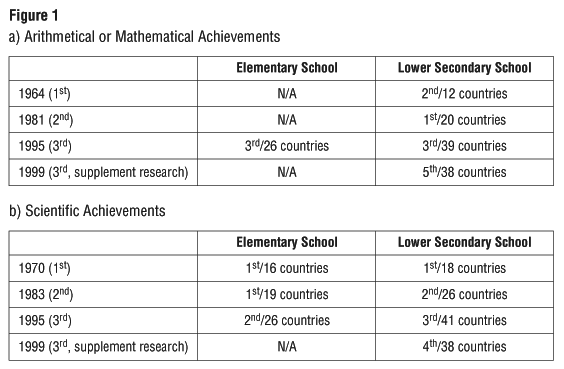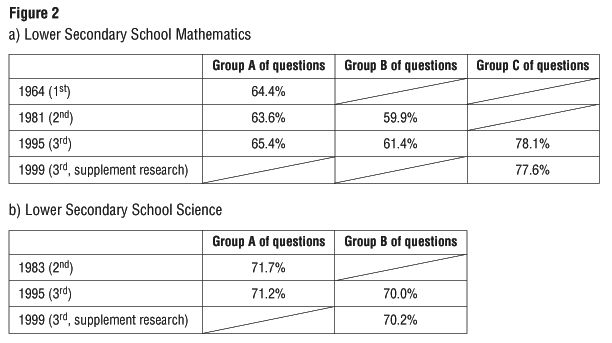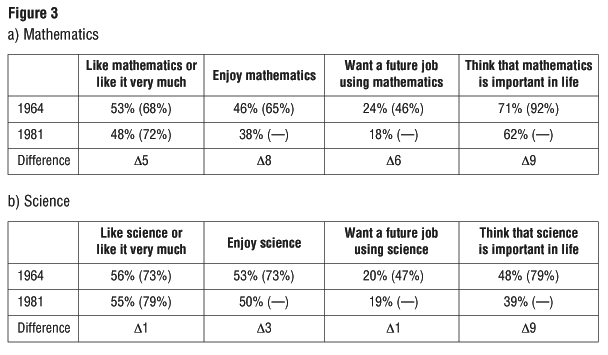| Home > Policy > White Paper, Notice, Announcement > White Paper > Japanese Government Policies in Education, Culture, Sports, Science and Technology 2001 >EDUCATIONAL REFORM Q&A Q8 | ||
|
Some people point out a decrease in children's academic ability. Is children's academic ability really decreasing? What kind of effort is being made to improve academic ability?
Although there is no definite data that shows a decrease in Japanese children's academic ability, Japanese children when compared internationally show poor results with respect to some yardsticks, including motivation to learn. Taking this fact seriously, MEXT is making various efforts such as increasing the staffing levels of teachers and other personnel to improve academic ability in line with the new Courses of Study, which aim at individually targeted teaching.
|
| Present State of Children's Learning |
We cannot say with certainty how Japanese children's academic ability has changed over the years, partly because no nationwide, periodical surveys have been conducted.
However, the results from some research give the following general ideas about the present state of Japanese children's learning:
{1} Research on Curriculum
(conducted twice, 1981-1983 and 1993-1995)
{2} International Research on Mathematics and Science Education (by the International Association for the Evaluation of Educational Achievement (IEA))



{3} OECD Programme for International Student Assessment

Judging from these findings, education should aim to develop children's ability to learn, think and judge on their own with a full understanding of fundamentals and basics.
It is important to acquire knowledge and skills, but we should not stop there. School education should improve children's academic ability in its truest sense, including children's motivation to learn as well as an ability to think, judge and express.
| New Courses of Study and Individually Targeted Teaching |
The new Courses of Study, based on the aforementioned state of children's learning, aims to realize individually targeted teaching, instead of one-way teaching of mere knowledge. With this fundamental goal in mind, it carefully selects educational content so that every child can acquire fundamentals and basics, and tries to develop a "zest for living," such as an ability to learn and think on his or her own.
There are some voices of concern that the new Courses of Study will lead to a decrease in children's academic ability because it reduces the amount of educational content common to all students.
However, given the intensity of changes that will occur in society, it may not be meaningful to fill children's heads with trivial knowledge. Rather, it is important to develop children's ability to think and judge on their own as well as to solve problems in a better way, with fully acquired basic knowledge.
The new Courses of Study thus tries to create a school environment free of time constraints and mental pressures by carefully selecting standardized content for education and taking advantage of such a school environment so as to:
Individually targeted teaching taking into account the situation of an individual child is an important element to achieve these goals of the new Courses of Study.
The new Courses of Study, while carefully selecting educational content common to all children, expand elective courses so that a school can give education tailored to each child's interests and abilities.
Through this, children who cannot fully understand the content provided in the Courses of Study are given opportunities to repeat the learning process, and children who have a sufficient understanding are given more advanced assignments in accordance with their interests and abilities.
To support each school's efforts, MEXT has taken the following measures:
In addition, MEXT plans to periodically conduct a nationwide, comprehensive survey on academic ability for the precise understanding of students' learning situations and improvements in teaching methods and curriculum.
Each school, with reference to the results of the nationwide academic ability survey, should self-monitor and self-evaluate the state of its students' learning and use the results of the evaluation to improve its education.
Currently, the Center of Curriculum Development at the National Institute for Educational Policy Research is studying the method for self-monitoring and self-evaluating.
It is hoped that the fundamental academic ability of all students be improved by the steady implementation of these measures.
| Back To Top | MEXT HOME |